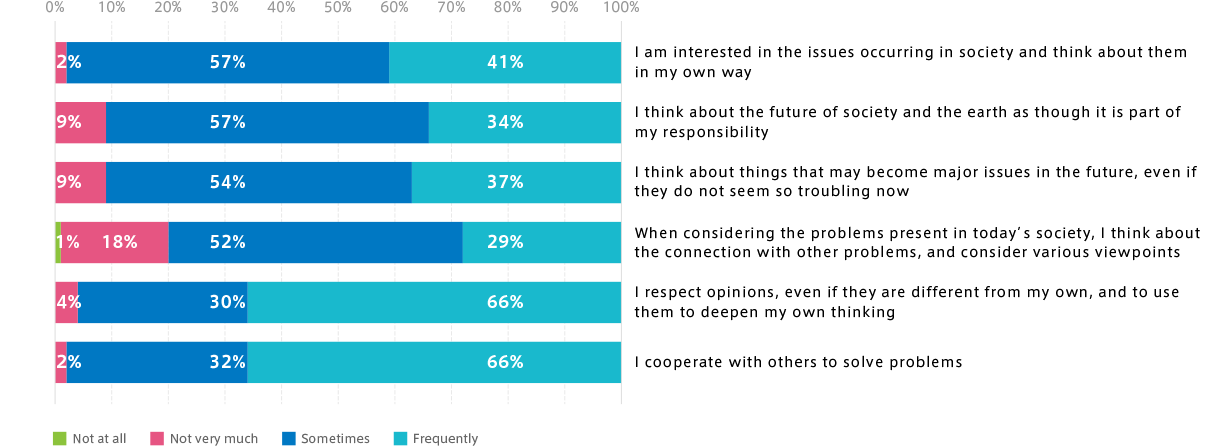
Human Resources Development
Mitsui SASUGAKU Academy
Fostering "the ability to create a sustainable future"
What is Mitsui SASUGAKU Academy?
Mitsui SASUGAKU Academy is a program that leverages Mitsui & Co.'s diverse business activities to facilitate inquiry-based learning. The academy was launched in 2014 as a human resources development activity, a key area of our social contribution activities.
In SASUGAKU classes, students are encouraged to gain an understanding of how sustainability works—with “economies” residing atop "societies" that are themselves based upon "environments”—using uniquely developed teaching materials.
From 2014 to 2019, the program was offered to 30 upper elementary school students selected from the general public. Students participated in the program for six hours a day over the course of five days. In 2020, with the introduction of inquiry-based learning into the curriculum guidelines for Japanese elementary, junior high, and high school students, the program took on a new form and began to be implemented in collaboration with participating students' schools. Since then, the purpose of the program has been to introduce the Company's initiatives as a means of fostering a sense of curiosity at each school and grade level at which the program is carried out, supporting the generation and implementation of ideas for solving various social issues rom a global perspective and from the standpoint of commercialization.
In 2023, under a comprehensive agreement signed between Toride City, Ibaraki Prefecture and our company to jointly promote the UN SDGs, Mitsui subsidiary e-dash Co., Ltd. conducted a class on decarbonization and the visualization of CO2 emissions at a Toride City elementary school. The elementary school students then began their own unique initiatives to visualize and ultimately reduce CO2 emissions, and entered the Zero Carbon Challenge Cup backed by the Ministry of the Environment, winning a Minister of the Environment Awards Gold Prize in the Junior/Kids' category.
Report: Mitsui SASUGAKU Academy 2023
In 2023, we held Mitsui SASUGAKU Academy programs at Satoe Gakuen Elementary School and Toride-Nishi Elementary School. In response to the ideas developed by students utilizing the SASUGAKU Compass and Future Timeline, we provided advice from a global perspective and from the standpoint of commercialization. Additionally, on November 24, 2023, the Mitsui Group 350th Anniversary Project collaborated with the international exchange program conducted by the Japanese Red Cross Society/Youth Red Cross to hold the "Mitsui Group x Youth Red Cross 'Sasugaku' Session.” For this session, eight Mitsui group companies made videos presenting their initiatives to address climate change and promote peace. The objective was to convey insights and messages by business people tackling social issues and to foster the participants’ awareness of the need to change certain behaviors to create sustainable futures.
- Satoe Gakuen Elementary School
- 76 fifth-graders
- Toride-Nishi Elementary School (Part 1)
- 35 fourth-graders
- Toride-Nishi Elementary School (Part 2)
- 35 fourth-graders
Take on the Mitsui SASUGAKU Academy challenge!
Mitsui SASUGAKU Academy 2024
Take the following steps and develop amazing ideas that address both familiar and global issues all at once!
-
01
Download the course materials
Problem-based learning (PBL) version: Groups and individuals decide the theme yourselves
Download the course material (PDF)
Seeds of inquiry version: Find the seeds of inquiry yourselves.
Download the course material (PDF)
* Materials are available in Japanese only.
-
02
Learn how to utilize the three techniques introduced in the video
* The video is subtitled in English.
-
03
Decide the theme, and begin developing ideas
Utilize the SASUGAKU Compass and Future Timeline to expand your ideas!
Share your ideas with others and get moving towards implementation!
-
-
* The video is subtitled in English.
Three Mitsui SASUGAKU Academy Tools

1. SASUGAKU Compass for Creating a Sustainable Future
- Applications:
- Idea generation in problem-based learning, and theme-setting in inquiry-based learning.
- Example:
- Second-year students at the Mitsukaido Daiichi Junior High School used the SASUGAKU Compass to generate ideas for solving social issues in their local community.

2. Future Timeline
- Applications:
- Predicting the future using various forms of current or past data (forecasting), envisioning a desired future outcome and then working backward to determine the steps and actions required to achieve that outcome (backcasting).

3. Mitsui & Co.'s Business
- Applications:
- Using Mitsui's business activities as case studies for solving social issues and to gain an understanding of how sustainability works—with “economies” residing atop "societies" that are themselves based upon "environments”.
- The Relationship Between SASUGAKU and the SDGs
- SDGs 4.7:
By 2030, ensure that all learners acquire the knowledge and skills needed to promote sustainable development, including, among others, through education for sustainable development and sustainable lifestyles, human rights, gender equality, promotion of a culture of peace and non-violence, global citizenship and appreciation of cultural diversity and of culture's contribution to sustainable development.
Take a look at past SASUGAKU Academy programs
2023

Theme: Take cues from presentations by Mitsui employees and try your hand at the challenges.
2022
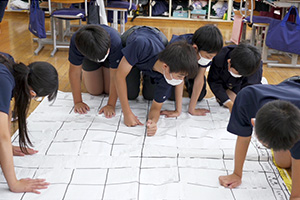
Theme: Take cues from presentations by Mitsui employees and try your hand at the challenges.
2021
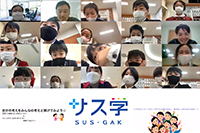
Theme: Take cues from presentations by Mitsui employees and try your hand at the challenges.
2020
We conducted an evaluation of the results of the Mitsui SASUGAKU Academy from FY Mar/2015 to FY Mar/2020, and examined methods for holding the program in FY Mar/2022 and beyond, keeping in mind the COVID-19 pandemic.
Program Evaluation
Mitsui SASUGAKU Academy - Measure of Effectiveness
We conducted a follow-up survey on how children who participated in the program "reflected" internally through the SASUGAKU experience and the extent to which they were able to put what they learned into action, as well as measuring their ability to create a future-thinking society. In 2020, in collaboration with the National Institute for Environmental Studies, we conducted a survey and interviews with participants of the SASUGAKU Academy and their parents from 2014 to 2019.
We received 56 responses from parents and their children (58.9% response rate).
Figure 2 shows what grade they were in at school at the time of participation, and Figure 3 shows what grade they are in now.
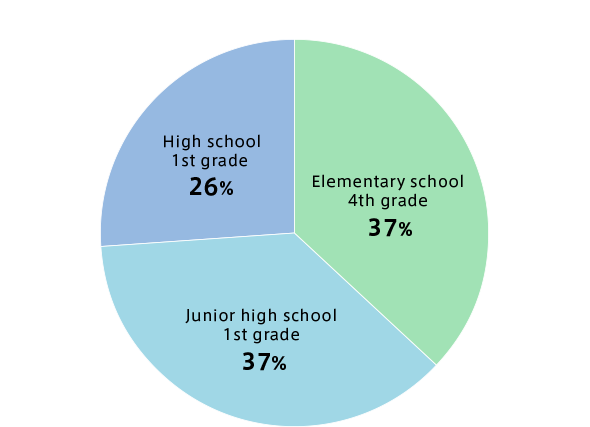
Figure 2: Respondent's grade at school at the time of participation in the SASUGAKU Academy
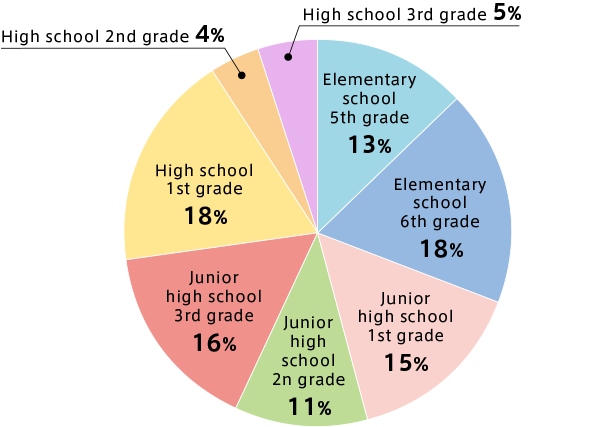
Figure 3: Respondent's current grade
Key points measuring the effectiveness of the “Ability to Create a Society Connected to the Future” program
- (After attending SASUGAKU Academy) Whether students maintained a heightened interest in societal issues
- (After attending SASUGAKU Academy) Whether students are studying and engaging in specific activities to address societal issues
- (After attending SASUGAKU Academy) Whether students have continued to show respect for the opinions of others, and have made changes in behavior to show empathy and understanding
- (After attending SASUGAKU Academy) Whether students experienced a change in awareness of career choices
(Example)
Is there anything that you became more aware of at home or at school, or something that you started (or stopped) doing, as a result of participating in the SASUGAKU Academy?
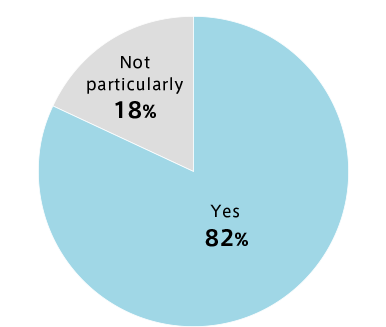
(Example)
Did your learnings or experiences at SASUGAKU Academy influence your career path or what you want to do in the future?
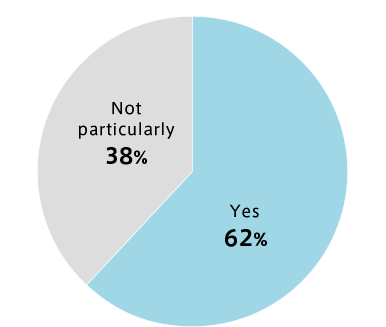
(Example)
Did anything you learned at SASUGAKU Academy help you in your later life, at school or at home?
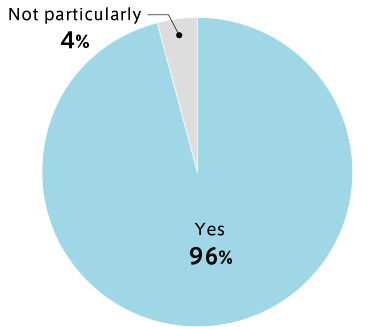
(Example)
How much do you use what you learned at SASUGAKU Academy in your life now?
